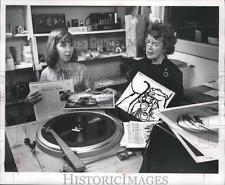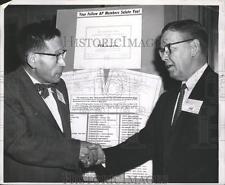 There’s nothing like a near-death experience to bring home the realization that it’s high time to get to work on that memoir you’ve been procrastinating about for ages. My own epiphany came about when I emerged from emergency brain surgery the day before Halloween. I’d been laid low by a subdural hematoma on October 29th—ironically, the same type of trauma that killed my mother in 1970.
There’s nothing like a near-death experience to bring home the realization that it’s high time to get to work on that memoir you’ve been procrastinating about for ages. My own epiphany came about when I emerged from emergency brain surgery the day before Halloween. I’d been laid low by a subdural hematoma on October 29th—ironically, the same type of trauma that killed my mother in 1970.
Hers was more acutely traumatic than mine. At age 61, she was just coming into her own as an account executive at a Milwaukee advertising firm, building on all the expertise and the wide network of contacts she’d gained as an unpaid volunteer while playing out the role of good wife as my father rose to prominence as the editor of The Milwaukee Journal.
But a heart attack forced my father into early retirement, and his doctors persuaded him to escape the brutal Wisconsin winters by spending a few months in Florida. So she took a leave of absence, and one April night, she took a header onto the bathroom floor in the house they’d rented in Sarasota. She was comatose for weeks. Then, against all odds, she regained consciousness, but her brilliant mind had been radically damaged, and she died that November.

My own subdural hematoma was kinder and gentler—a slow bleed following a fall I must have taken while pruning the lower limbs of some young maples while sipping gin and tonic in my garden in mid-September. I awoke the next morning with a black eye, bruising and pain in my temple, but a doctor checked me out and told me it wasn’t serious. How wrong he was.
Six weeks later, recovering in the neurosurgical intensive care unit, my skull cobbled together with eighteen staples, I decided the time had finally come to get to work on a memoir. At 77, I’d had my closest brush ever with death, and I had no memory of the fall that precipitated my medical crisis. Could alcohol have played a role? I hadn’t been drunk, but it’s possible the gin and tonics threw me a bit off balance, and that I tripped over one of the irregular blue stone pavers in my shade garden.

Could my mother’s fatal fall have been alcohol related as well? It’s quite possible, since my parents loved their dry martinis, but I hadn’t dwelt on the subject until my own subdural hematoma conjured up the eerie parallels to my mother. Another parallel was her love of writing. In my earliest memories, I’m sitting on the floor beneath her desk, scribbling on yellow typing paper while she taps out short stories on a Smith Corona typewriter. As I later learned, she sent them off to The New Yorker, but received only rejection slips in reply. Eventually she gave up trying. At some point she threw them all away, and she never mentioned them again.
My father was an aspiring writer too. As a young man in the 1920’s, he rode the rails and lived in hobo jungles, accumulating material for what he hoped would become The Great American Novel, but when he became a journalist and rose through the ranks from reporter to Executive Editor, he abandoned his dreams of literary glory. Like my mother, he destroyed all evidence of his attempts at fiction.

How I would love to read what they wrote in their younger years. Alas, like me, they were both ruthless critics of their own creative efforts. They measured success in terms of acceptance by first-rank publishers of books and magazines. If they failed to scale those lofty heights, they saw no point in saving their work for posterity, if only for their own family.
Thanks to modern publishing technology, things are different today. I’ve written five novels and published three of them. I tried going the traditional route, querying agents and editors, even landed a leading agent in New York, but she didn’t sell my work. I hated rejection, so I gave up far too soon. Instead, I opted for the self-publishing route, so I have the pride and pleasure of holding my very own professionally published books in my hands, selling them locally or on Amazon. Sales have been fair, but my marketing efforts have been minimal, so there’s always room for improvement. As with the title of my soap opera vampire novel, Hope Dawns Eternal.
Unlike my parents, I intend to leave plenty of writing behind me when I go, if only for my daughter and grandchildren. And that leads back full-circle to my memoir. I began on my laptop the day after I was discharged from the ICU to a rehab center in Schenectady. At first I was delighted with the idea of being pampered, with my very own private room, all my needs met while I immersed myself in my writing—my very own writer’s retreat, subsidized by Medicare. I soon found out things didn’t quite work that way. I was poked and prodded, with nurses checking my vitals at all hours, and unrelentingly cheerful physical and occupational therapists urging me to get moving. But I got a decent start. I was home before Thanksgiving, and I’m plugging away at the book project I’m convinced will be my best yet.
Subdural is evolving into a blend of prose and poetry, a collage of sorts, with a focus on my near-death experience of recent months and flashbacks to crucial life experiences that led me to the present day, focusing especially on memories of my mother, who died far too young. I’ve already outlived her by sixteen years, and I’m hoping for a couple of decades to go.

I published this essay in January as a guest blogger on Kathy Pooler’s website, Memoir Writer’s Journey But now that two months have passed, I’ve decided it’s high time to repost it here. My SUBDURAL book project is coming along well, and in a follow-up visit this week, my neurosurgeon said I’ve made a total recovery and officially discharged me from his practice. He says moderate drinking is okay but cautions me not to fall down again!
Speaking of drinking, my parents loved the Algonquin Hotel in New York City, headquarters of the Round Table writers made famous in The New Yorker. When my mother and I visited the city, we stayed at the Algonquin. Just last week, after seeing a Sam Shepard play starring Ethan Hawke on Broadway, I stopped into the Algonquin for a drink in the lobby–the Dorothy Parker Cocktail.
I’d love to hear your comments. And if you haven’t yet done so, please subscribe by going to the menu bar at the right so that you won’t miss future posts. Now that spring is in the air, I’ll be stepping up my game.
Marj Hahne says
Julie, I love and admire this window into your world, your history, your heart and–hallelujah–your healthy brain. What an honoring account of your parents and their contributions to your creative/writer self. Your voice is compassionate and generous. SUBDURAL promises to be captivating.
Julie Lomoe says
Marj, thanks so much for the lovely comment. It reads like a book blurb, and I’d love to use it elsewhere if that’s okay. I’m looking forward to your online prose/poetry workshop in a couple of weeks.